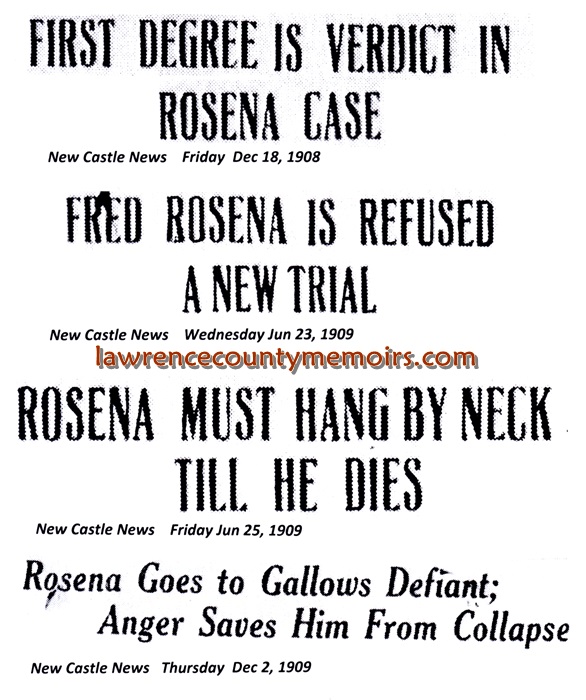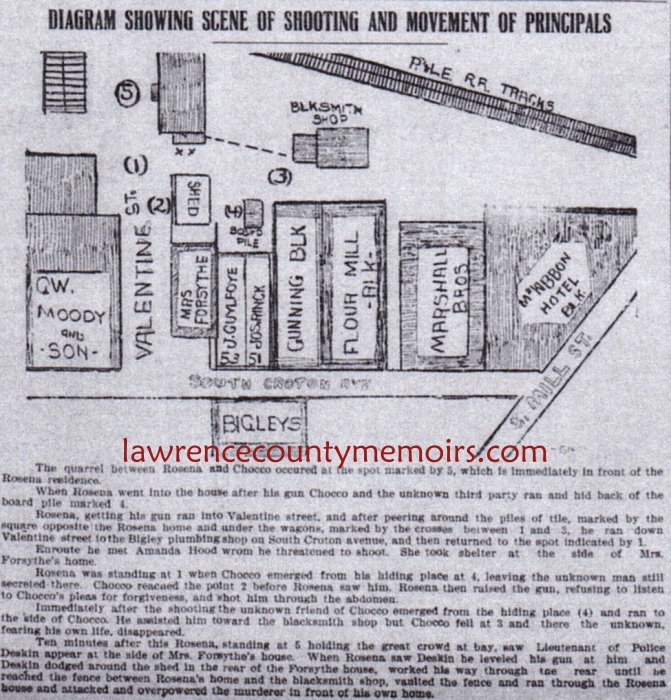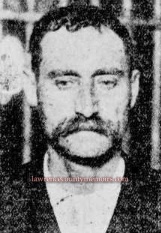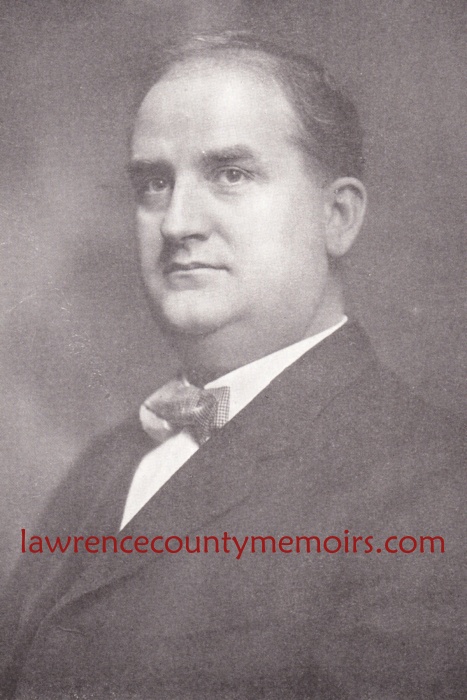On the late afternoon of Sunday, July 12, 1908, a group of people were playing cards in a house at #118 Valentine Street in New Castle, Pennsylvania. The residence was the rented home of forty-nine-year-old Italian immigrant named Fred Rosena (Ferdinand Rosrno). He lived there with his Italian wife Frances, his three small children, and two of his sisters. Valentine Street is no longer on modern-day maps, but it was roughly west of Produce Street along South Croton Avenue.
Rosena, who was born in Italy in 1860, had come to this country as a teenager and settled in New Castle in 1883. He was married in about 1902 and started a family. He was well-known around the Italian community, as a con man and gambler. He had occasionally been employed as an interpreter with the Lawrence County Court House. He was part of a celebrated lawsuit in late 1904 in which he sued the county commissioners for $50 he said they owed while employed as an interpreter. The court ruled against him.
He was known to be violent and had several run-ins with the law dating back a decade. One of the worst incidents was took place in December 1900 when he had been involved in a vicious knife fight with a man at the Union Depot on Pittsburg Street (East Washington Street). Both men were injured, but the other man – who was stabbed in the back – was hospitalized for some time. Rosena was charged with assault and attempted murder but was eventually cleared. In more recent years he had also been cited for threatening or assaulting his wife on numerous occasions.
Back to the evening in question, July 12, 1908, a dispute of some sort ended the card game and several neighbors departed. Fred Rosena and his wife and her cousins John Chocco and Philip Chocco remained. John Chocco had apparently come up from Pittsburgh about two weeks prior to stay with his cousin (Mrs. Rosena). A physical altercation of some sort ensued between Rosena and John Chocco. Rosena rushed into a back room and reappeared with a loaded .38-caliber Winchester rifle.
NOTE: Various reports refer to John Chocco as the “brother-in-law” of Fred Rosena. After in-depth research I don’t believe this to be true. Chocco was a cousin of Mrs. Frances Rosena – and not her brother.
Meanwhile, John Chocco, also known to have a violent past, and his brother Phillip fled the house and hid out nearby. Rosena, brandishing the rifle, went out onto the front porch and looked around. He was angered could not find John Chocco and then walked up to Croton Avenue looking for him. He then returned towards the house, threatening several people along the way. A neighbor named Amanda Hood said he attempted to shoot at her, but the gun misfired. Once he returned to the house John Chocco suddenly appeared from hiding with his arms raised. Chocco initially attempted to reason with Rosena and according to witnesses he then begged for his own life.
The New Castle News of Monday, July 13, 1908, reported on the subsequent events with this, “As Chocco approached Rosena the latter muttered something and raised his rifle to his shoulder and snapped it. The first trial failed for the rifle appeared to be out of working order. Rosena, however, seemed to know what was wrong, for he took the gun and shook it violently and pounded the magazine on his hand. When it was all right again he deliberately raised it to his shoulder and stepping forward a few feet – for Chocco, seeing Rosena was determined, had backed back – fired point blank at his victim. Chocco staggered, placed his hand on his side and tottered” continued (witness John) Guylfoye. “Then the third man came from behind the board pile and ran to Chocco’s side. He assisted Chocco towards Vogan’s blacksmith shop in the rear of the Rosena house and there the wounded man played out and sank to the ground exhausted. Rosena had been watching the two men and when the third man saw Rosena following them he deserted Chocco and disappeared, and has not since been seen.” The article went on to report, “As soon as Chocco was left by his friend several persons started towards the wounded man. Rosena leveled his rifle at these and ordered them to get out of sight, which they readily did.”
Rosena chased after a group of bystanders and threatened them as they scattered. He then returned to his porch and stood looking out as a curious crowd began to gather in front of the porch. Chocco, shot in the abdomen, lay dying just fifty feet away. Rosena, with his four-year-old daughter Rosie hanging on his leg, murmured at the crowd but remained calm. Several police officers soon arrived on scene and surveyed the situation. James “Jim” Deskin, the Irish-born Lieutenant of Police for the New Castle Police Department, pushed his way through the crowd and was immediately threatened by Rosena. Deskin had arrested Rosena before and was well aware of his temper.
Deskin backed away and then made his way around to the rear of the Rosena house. He entered the rear door, rushed through the house, and exited out the front door. Rosena saw the approaching officer at the last second, but it was too late. Deskin disarmed him with one hand and landed an uppercut with the other. A stunned Rosena fell off the porch and Deskin was quickly on top of him. Rosena was put in handcuffs and led back into the house. Rosena reportedly told the police he was glad he had killed his victim. Chocco was rushed to the Shenango Valley Hospital and underwent surgery for four hours. He died of his gunshot wound later that evening. Before surgery he reportedly told police that Rosena shot him over a dispute over money. The crowd was cleared and Rosena was then led to the police station in the basement of the City Hall building. On Wednesday, July 15, Chocco was laid to rest in St. Vitus Cemetery in Shenango Township.
Police were initially believed the fight was over money, but another possible motive was soon developed. The New Castle News of Monday, July 13, 1908, had this to report, “It seems that Rosena’s abuse of his wife has had much to do with it. Rosena’s treatment of the woman has been almost inhuman. Several bald spots on her head show where he, in his fury, has pulled her hair out by the roots. Great patches the size of dollars testify to his barbarous treatment of her. Neighbors and police records also tell of the outrageous treatment to which she has been subjected. Amanda Hood has written several letters to the district attorney for Mrs. Rosena asking if there is not some relief for her – some protection from her husband. “That is why Rosena was so willing to kill me this afternoon when he was out killing,” said Mrs. Hood by way of explaining Rosena’s motive for pointing and snapping the gun at her. Two weeks ago John Chocco left his wife at Pittsburg and came to New Castle to make his home with… Mrs. Rosena. He explained that his wife had taken up with another man, but Rosena did not believe this. He believed that Chocco was there at the instance of Mrs. Rosena or some other who wished to interfere with Rosena’s home affairs – with his privilege of beating his wife whenever he desired. It is believed to have been this suspicion of Chocco that led to the shooting Sunday afternoon.”
On the afternoon of Monday, July 13, Rosena was taken upstairs from his cell in the City Hall building and provided with a hearing before Mayor Harry J. Lusk. Lusk ordered him held without bail pending a court date the coming September. Rosena was soon taken to the Lawrence County Jail. Among his fellow inmates was the infamous Black Hand leader Rocco Racco, who was later executed for his part in killing game warden Seeley Houk back in March 1906.
Rosena was initially defended by C. Henry Akens, but he withdrew later that fall. Soon after this the court appointed attorneys William J. Moffatt and Wylie McCaslin to defend Rosena. On Tuesday, September 8, 1908, Rosena was formally indicted for the murder of John Chocco. His new legal team immediately asked for a three-month delay in the trial and Judge William E. Porter granted it. Rosena would remained locked in the county jail until his trial began.
Rosena was called upon to testify in the trial of Rocco Racco in mid-September 1908. The New Castle News of Wednesday, September 16, 1908, reported, “A sensational feature of the trial Wednesday morning was the testimony of Fred Rosena, who is in jail for the murder of his brother-in-law. Rosena contradicted the testimony which he had given before Alderman Green. He said there that Racco had threatened Houk’s life but in court claimed Racco said he would kill the man who killed his dog. When asked why he changed his story he said that Racco had threatened to kill him in the county jail for testifying as he had done before the alderman.” Racco was soon convicted and then sentenced to death.
In the middle of November reports surfaced that Rosena, who was very sick with the flu, had died in jail. The jail officials, led by Lawrence County Sheriff John W. Waddington, had to ensure folks this was not the case and Rosena would be fit to stand trial.
Jury selection began in early December 1908 and was a tough task as everyone seemed to have a strong opinion on the case. The trial began on Tuesday, December 15, 1908, in the courtroom of Judge Porter. Prosecuting the case was District Attorney Charles H. Young, assisted by attorney Roy M. Jameson. Rosena entered a plea of not guilty. He claimed that he was afraid of the Black Hand Society, the Italian criminal organization, and had purchased the weapon used in the murder for the protection of his family. During the trial Rosena’s wife testified on his behalf. A key witness to the murder, Phillip Chocco, had fled immediately after the murder and was never located.
Rosena testified that he had killed John Chocco in self-defense after the two had gotten into an argument over money matters. The New Castle News of Thursday, December 17, 1908, reported on Rosena’s testimony with, “Placed on the witness stand in his own defense, Wednesday afternoon, Fred Rosena, charged with the murder of John Chocco, gave his version of the trouble at the Rosena home of July 8… He said that following a card game at the Rosena home on the fateful Sunday afternoon, he had become involved in a dispute with Coccho and that Coccho had grabbed him by the throat and threw him down. Coccho, he said, then picked up a huge butcher knife and was about to out his throat when Mrs. Rosena dragged him off. Coccho said he would kill Fred until he was six feet under the ground. Coccho left the house but came back again and renewed the quarrel. It was then that Rosena secured his gun, Rosena claimed that Coccho was standing between him and his home when he fired and that he did so to protect his home. Mrs. Rosena, who was on the witness stand all afternoon Thursday, also testified that Coccho had assaulted her husband and bad dragged him to the kitchen. Coccho was in the act of drawing a butcher knife on Rosena when she interfered. Mrs. Rosena claimed that Coccho had pointed the knife at her and had threatened that he would kill both her and Fred before he left the house.”
Mrs. Rosena testified, “She had known John Chocco on Italy. In fact he had wanted to marry her. She said he was a bad man and had been arrested 12 times in Italy and had tried to stab his mother. She said John Chocco had come to this city from Pittsburgh to avoid arrest.” She was then cross examined, “Did not John Chocco come here during the month of June in response to a letter written by you? asked District Attorney Young. “Yes, we wrote back and forth. I gave the letters to my husband to mail.” “Did you not write to Cocho (sic) and tell him to come here because your husband was abusing you?” Objection was raised to the question. Objection sustained. Mrs. Rosena then explained that Coccho had written her saying he wanted to come here and she had answered if you want to come then come.”
The trial lasted three days and ended on Thursday, December 17, 1908. The jury deliberated all night and reached a verdict before the court reconvened at 9:00am the next morning. The New Castle News of Friday, December 18, 1908, reported, “Rosena, who stood with uplifted hand, while the jurors each answered “Guilty of murder in the first degree,” was visibly affected although he stood up well, as his doom dropped from the lips of the twelve men. Mrs. Rosena, who sat beside her husband, also bore up bravely, and there was no “scene” in the court room. Immediately after the verdict had been pronounced Rosena was led back to the county jail. He had nothing to say.”
An appeal was soon filed by Rosena’s attorneys and a hearing for a new trial was held before Judge Porter on Friday, March 5, 1909. Porter considered the motion and ruled against it, while announcing his decision on Wednesday, June 23, 1909. That same day the New Castle News reported on how Rosena took the news, “He grew very pale when the decision was announced. As Sheriff Waddington led him back to jail his eyes filled with tears and by the time his cell was reached he sank on the hard floor, wailing and sobbing like a child.” The Reverend Nicholas DeMita, his spiritual adviser and the pastor of St. Vitus Catholic Church, would provide him with comfort in the coming months.
Two days later Rosena was back in the courtroom to hear his sentence. The New Castle News reported, “The sentence of the court is that you, Fred Rosena, suffer death by hanging and that you be detained in the county jail until such time as the governor may fix for your execution, and may God may mercy on your soul. In a deathlike stillness that pervaded the court room Friday morning Judge Porter thus pronounced sentence on the murderer of John Coccho. Rosena, pale trembling, his eyes glancing furtively about the room, stood before the bar of justice. “Thank you” he said, as the court ceased speaking, and turning, was led from the court room by Sheriff Waddington.”
At that time executions in Pennsylvania were handled by the local counties, and in this case Lawrence County Sheriff John W. Waddington would be responsible for the execution of Rosena. It wasn’t until 1913 that the state took over responsibility for all state-wide executions, and mandated electrocution as the preferred method of execution.
The New Castle News of Friday, October 22, 1909, reported, “Governor (Edwin) Stuart has fixed Thursday, December 2, as the date for the execution of Fred Rosena, convicted of the murder of John Coccho. This will bring the execution within the term of office of Sheriff Waddington. If the Rocco Racco execution takes place as scheduled (on October 26) and Rosena is granted no respite, it will make the fourth hanging for Sheriff Waddington since he assumed the duties of his office. This is remarkable as in the history of the county there was only one execution, that of Frank Jongrass, before Sheriff Waddington assumed office. Waddington has already hanged Rosario Serge and Charles Quimby. The crime for which Rosena is to stretch hemp was probably one of the most cold-blooded murders that has ever been committed.”
In late November an application was made to the Pennsylvania Board of Pardons to have Rosena’s sentence of death commuted to one of life imprisonment. The application was denied. The Reverend Nicholas DeMita, a leading voice in the local Italian community, sent off a last day telegram asking Governor Stuart for leniency. The governor replied with, “After careful consideration of the request contained in your telegram for a respite in the case of Fred Rosena, in view of the fact that the board of pardons has refused application for commutation of sentence, I have concluded not to interfere with the judgment of the courts. Edwin S. Stuart.”
The New Castle News of December 2, 1909, had this to say about the sad evening before the execution, “Rosena last night was shaved and after alighting from the chair In which he had been propped for the barber, he danced around the sheriff and had playfully put up his fists and had said he wanted to fight. He was In the best of spirits, apparently, from the sheriff he went over in front of his little son and did a clog and low monkey dance that threw the youngster in a fit of laughter. Mrs. Rosena standing aside with tearstained eyes viewed all of this with a faint smile. Following this Rosena and his little family were left alone for some time and when It came time for them to part for all time, Mrs. Rosena utterly broke down. She was in a worse state of collapse than her husband. Repeatedly he sought to cheer her but she would not or could not listen. Finally the guards gently drew her away and as they did so her screams could be heard to the streets outside of the jail. In Italian she shrieked repeatedly, “O, my God!” “O, my God!” Once she broke loose from the guards and ran back and threw herself on her husband and there a flood of tears relieved her of her hysteria for a moment. At her skirts clung her children and at last the combined efforts of all the guards were required to move the heart-broken woman who continued her agonizing screaming far out of the jail and down Pittsburg Street.”
On the morning of Thursday, December 2, 1909, Rosena was led to the gallows set up in the courtyard of the Lawrence County Jail. The New Castle News reported on the execution with, “Fred Rosena was fighting mad when he went to his death on the scaffold this morning. There was nothing of the coward about him. He did not think so much of his impending death as he did of making “a speech that would make them smart.’ He made the speech all right and he spoke right out in meeting, with a voice firm and strong; and from a mind that appeared to be clear, but the speech was not so bitter as was expected from those who had been with the man during the last hour of his life. He said: “Gentlemen, I am much obliged for the chance to talk. I am a citizen of the United States. I belong to Uncle Sam. I am a free man. I am going to my death honestly and because I defended my family. I got no justice in my trial. That was because some of them were against me. They do not want honest men in this country. I’m done. Goodbye.”
At about 10:17am, after being hooded, Sheriff Waddington pulled the lever and sent Rosena to his death. He was declared dead at 10:30am by Dr. Elmer P. Norris. The remains, prepared by the Lutton Undertaking Company, were taken to the Rosena home on Valentine Street for a wake. The next morning a small service was held at St. Vitus Catholic Church and afterwards the remains were interred in St. Vitus Cemetery. It was a sad ending to a senseless crime.
At some point Frances Rosena was remarried to John B. Matura, an Italian immigrant who operated a grocery store on South Jefferson Street. Matura was no stranger to trouble, as he was cited for gambling and other criminal offenses on several occasions. In the summer of 1919 fifteen-year-old Rose Rosena, the oldest daughter of the late Fred Rosena, fled the house and moved in with an aunt named Mary Stephano. Rose claimed that her mother was beating her. What followed was a nasty legal battle that continued on for several years. In those days children were not generally considered adults until they reached the age of twenty-one. The case appears to have been settled in the summer of 1923 and Rose, then aged nineteen, was allowed to determine her own living arrangements. It’s presumed that Frances (Rosena) Matura, who became a naturalized citizen in 1913, lived out her days in New Castle.
 |
 A drawing of the murder scene along Valentine Street. (1908) |
 The death certificate of John Chocco, which oddly enough lists the cause of death as “from a gun shot wound fired from a gun in the hands of Fred Rosena Murdered.” I don’t think that would fly today… not without a trial and all to determine official guilt. (1908) Full Size |







Comments
There are currently no comments on this article.
Comment